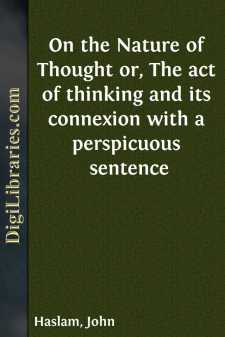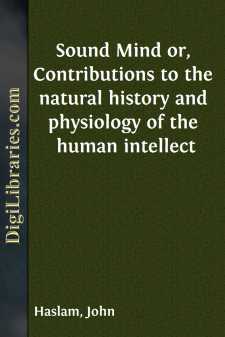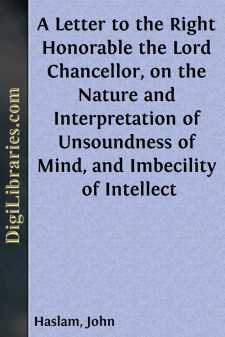Categories
- Antiques & Collectibles 13
- Architecture 36
- Art 48
- Bibles 22
- Biography & Autobiography 813
- Body, Mind & Spirit 142
- Business & Economics 28
- Children's Books 15
- Children's Fiction 12
- Computers 4
- Cooking 94
- Crafts & Hobbies 4
- Drama 346
- Education 46
- Family & Relationships 57
- Fiction 11828
- Games 19
- Gardening 17
- Health & Fitness 34
- History 1377
- House & Home 1
- Humor 147
- Juvenile Fiction 1873
- Juvenile Nonfiction 202
- Language Arts & Disciplines 88
- Law 16
- Literary Collections 686
- Literary Criticism 179
- Mathematics 13
- Medical 41
- Music 40
- Nature 179
- Non-Classifiable 1768
- Performing Arts 7
- Periodicals 1453
- Philosophy 64
- Photography 2
- Poetry 896
- Political Science 203
- Psychology 42
- Reference 154
- Religion 513
- Science 126
- Self-Help 84
- Social Science 81
- Sports & Recreation 34
- Study Aids 3
- Technology & Engineering 59
- Transportation 23
- Travel 463
- True Crime 29
On the Nature of Thought or, The act of thinking and its connexion with a perspicuous sentence
by: John Haslam
Description:
Excerpt
In our survey of the Creation endowed with life and intellect, we are impelled to the conclusion, that the human mind is, beyond all comparison, the most perfect specimen that the Divine Author has chosen to allot to his creatures. The history of our species unfolds the splendid catalogue of man's achievements: many monuments, reared by his patriotism and piety, and elaborated by his tasteful ingenuity, that have resisted the corrosions of time, and the spoliations of conquest, remain in our possession: and we still preserve those intellectual treasures that embalm the poetry, the eloquence, and the wisdom of the enlightened nations of antiquity. These are, deservedly, the models we have endeavoured to imitate, and they have even been considered the boundaries of attainment: but a new epoch has arisen, distinguished for the cultivation of that which tends to ultimate advantage, where the mind, confiding in its native energies, and exercising its own thought on human affairs, has been less disposed to submit to the dictates of authority.
At this period we possess abundant facilities for the acquirement of valuable knowledge: under this system, the mental faculties have been directed to their proper objects, and the time consumed in teaching has been considerably abbreviated. This abridgement of the usual course of education has conduced to the neglect of that classical learning, which required a painful and enduring attention, even for many years, to two languages that have ceased to be spoken, and are only addressed to the eye in written character. It is in no manner intended to under-rate the value of classical literature, the constituent of a scholar, and the passport and ornament of a gentleman; but to introduce a very probable opinion, that few of those who have devoted many of the most productive years of their existence to the Greek and Latin writers, ever attain a critical knowledge of those tongues: and that the substance of morals, wisdom, and even the elegant turns of expression, may be more certainly conveyed through the medium of the best translations, which we now possess, and the performance of which has occupied a large portion of the time of accomplished scholars. This conversion of talent to that which is useful, and productive of emolument, has given a more energetic impulse to the mind, and accelerated that march of which we now so justly boast: but it cannot be denied, that in the rapidity of our advancement, and flushed with the ardent hope of arriving at our destination, we have bestowed but little notice on the machinery that urged us forwards, or contemplated the scenery through which we passed.
Most persons concur that the human mind is the noblest subject of investigation; but few will be at the trouble of undertaking its analysis. With the multitude there is neither leisure nor inclination, and the doctrines that have been dictated concerning our intellectual faculties and their operations, have tended rather to stifle than to promote inquiry. It is therefore unnecessary to enumerate the catalogue of illustrious names whose contradictory systems have created suspicion and distaste in the student. The science that has been improperly termed Metaphysics, ought to be considered a branch of human physiology, not abstracted from, but in this state of existence, connected with the phenomena of life. The citations on the reverse of the Title-page, to which many more might have been added, clearly shew that the doctrine of words being the elements of Thought, did not originate from my own conjecture or inference, and, consequently, that the endeavour to investigate its truth has been the sole object of my research; under the persuasion that, if ideas were inadequate, words only remained to afford the solution of this important process. The necessary connexion of thought with the construction of a perspicuous sentence, has not, to my knowledge, been previously noticed.
We are said to THINK on certain subjects, and this process is confessed to require an intense exertion of our intellectual faculties: but for this operation, the materials have not been clearly specified, nor the manner of the elaboration defined....




